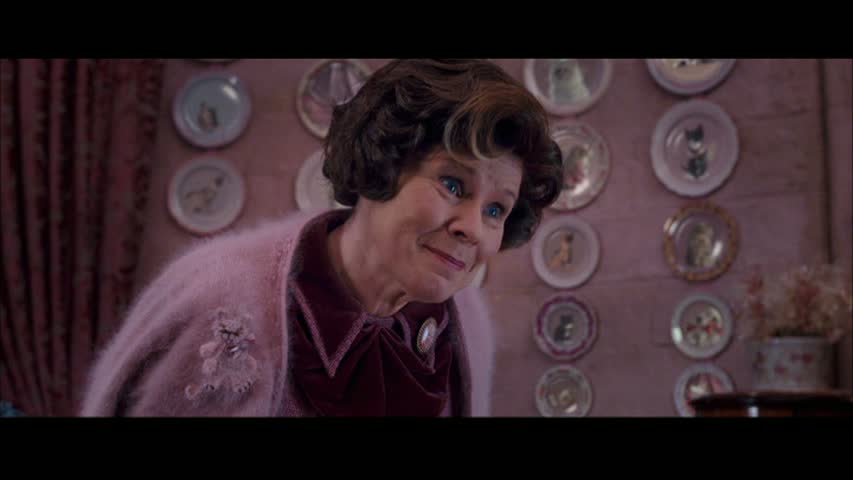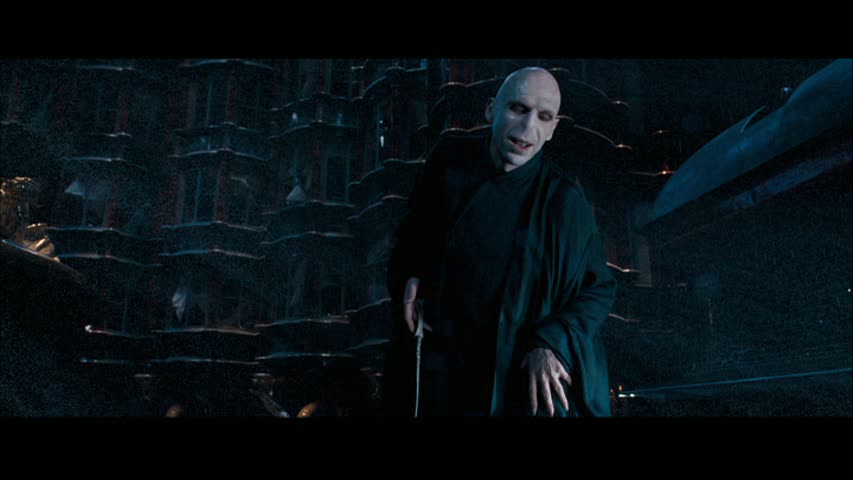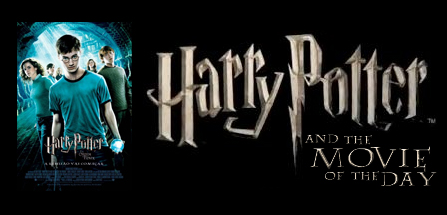
The Film: Harry Potter and the Order of the Phoenix (2007)
The Principals: Director: David Yates. Daniel Radcliffe, Emma Watson, Rupert Grint, Michael Gambon, Imelda Staunton, Ralph Fiennes, Michael Gambon, Alan Rickman, Gary Oldman, Maggie Smith, Emma Thompson, Helena Bonham Carter, David Thewlis, Natalia Tena, Jason Isaa–look, just…ENGLAND. Okay? The entire population of ENGLAND is in this movie.
The Premise: Following the events of The Tri-Wizard Tournament, The Ministry of Magic is attempting to cover up the truth of Cedric Diggory’s death and Voldemort’s graveyard return. To that end, Cornelius Fudge has not only launched a smear campaign to slander the good names of Harry Potter and Dumbledore, but installed a new Ministry-approved Defense Against The Dark Arts teacher at Hogwarts, an ultra-conservative official named Dolores Umbridge (Staunton) who slowly but surely begins to enforce government–and her own–control over the school’s operation and curriculum. Alienated by his infamy upon his return to Hogwarts, even by an uncharacteristically distant Dumbledore, Harry has no choice but to put his teenage frustrations to good use, and kickstart a rebellion.
Is It Good: Hell yes. While Goblet has the honor of being the first film in the series to get slapped with a PG-13, Phoenix is the film that truly earns it beyond dead Ed Cullen, and a drippy Voldefetus growing up to be Ralph Fiennes thanks to his steady, voracious diet of scenery. Goblet represented a jump in kineticism and romantic tension. Phoenix represents a jump in maturity and subject matter, the crucial kind of jump that, like Prisoner of Azkaban before it, guarantees the endurance of this series. I envy the shit out of the kids who literally grew up with these films.
It’s the first movie that completely lays the smackdown on its source material. Order of the Phoenix, the book, is everything great and awful about the Harry Potter series as prose exaggerated to the nth degree. Her characters, her major beats, the expansion of this universe both inward and outward; these things are amazing. Her ability to actually write them beyond the skills she employed in the first two childrens’ books of this series, not so much. Actually, that’s slightly unfair. She’s fine as a writer, but for where she ends up taking this story, Rowling didn’t really raise her game accordingly. One assumes it’s to keep the series accessible to younger readers, which is admirable, but it’s kind of a double edged sword.
Regardless, where Rowling falters, David Yates excels.
Yates was chosen to take Phoenix based on his TV work, none of which I’ve actually seen, though I’ve seen the filmed State of Play, and thinking about that film with Yates’ sensibilities in this series in mind, a line can be drawn very easily to Phoenix. The wider wizarding world opens up in this story. Harry and the gang are now privy to its politics, its adult relationships, the shades of gray in its morality, where one’s decisions have higher stakes and consequences, where the decisions your leaders make for you are not necessarily in your best interests. Yates is far more concerned with how his protagonists deal with this rather than the actual machinations of the bad guys, a trap the earlier films fall in to way too easy. And yet, these are still teenagers we’re dealing with, young witches and wizards to boot. The books as a whole have a wobbly grasp on how to get those two aspects of the story to marry, but Yates nails it his first time out.
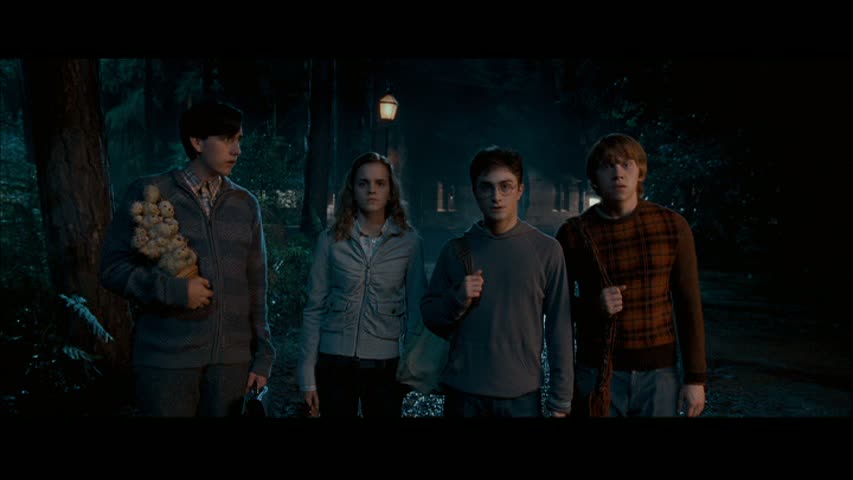
It’s apparent right from shot #1. The opening scenes are our first look at the “real world” beyond Hogwarts in ages, a sweeping shot over a London suburb, a weather report on the radio, and normal kids just playing on a merry-go-round. It’s disturbed by a newly gangsta-wannabe Dudley Dursley, and it’s kind of a brilliant, darkly comedic touch getting to see Dudley going through his own teenage rebellion phase that completely shrivels away once faced with a Dementor attack in a dark alley, and never bats an eyelash when the Howler comes down to expel Harry from Hogwarts. The sure-handedness of that transition from the real to the magical world has never been as smooth as it is here, partly due to Yates not stopping to show the audience a new thing the effects department can do like the previous films had a bad habit of doing, partly due to the fact that the magical world does actually start spilling into ours at this point, but mostly due to the fact that the reverse is also happening. The fact that we’re dealing with a world where wand-waving, potions, mythical creatures are all real does not change the fact that these kids are fighting to become adults, and this is that time when the world helps them decide what kind of adults they’re going to be.
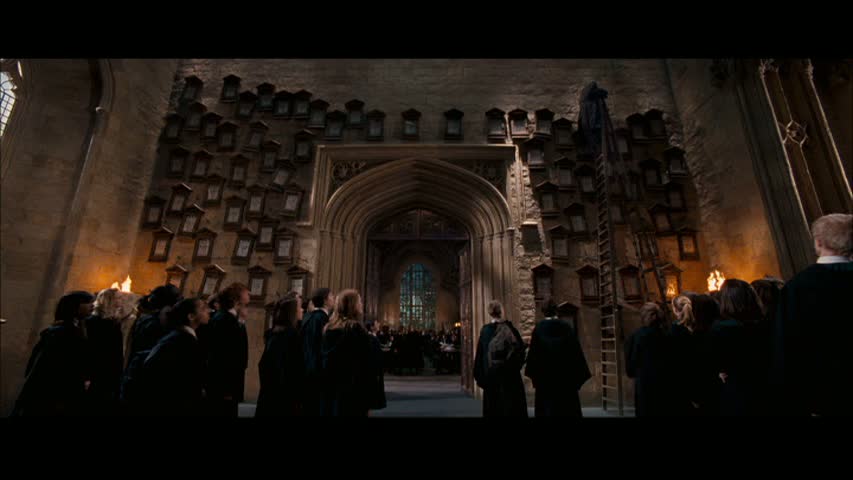
That’s the real plot of Order of the Phoenix. What kind of man does Harry Potter want to be when he grows up? Not the newest magical object Voldemort wants to get his hands on, even though it’s the whole point behind the Ministry break-in in the 3rd act. Not just the awkwardness of puberty, though there’s still remnants of that from Goblet that show up. It’s about the real world creeping up on these kids, and having them mentally and emotionally arm themselves to face it. As always with this series, thinking back to where we started, seeing these kids come this far as people on screen is an amazing thing, the thing that makes the whole thing great. The emotional climax of the film is a goosebump-inducing montage of Voldemort attacking Harry with all his tragedies, and Harry fighting back with the simplest, happiest moments from the past 4 films, a moment that was more about Dumbledore in the book. Aside from the 100-wand Salute in Half Blood Prince (another moment in Yates’ films miles better than the source), it’s possibly the most satisfying climax in in the series so far, but also the strongest proof of that throughline of children growing up through adversity being this series’ greatest strength.
The entire cast gets a chance to shine in this film, and it’s easy to give Imelda Staunton all the kudos in the world for making a character who was already a great evil cunt on the page a spectacularly evil cunt in the flesh, or Evanna Lynch for imbuing her character with a sweetness and empathy even Rowling wasn’t able to really capture in print, but for my money, Gary Oldman’s the MVP. The man’s gone on record that his appearance in Azkaban was a quick paycheck, but even though it’s a small role, it’s a vital one. His patience pays off here, however. Phoenix makes Sirius Black the linchpin upon which Harry’s arc for the next two films hangs. Who the hell knows if the wizarding world was affected at all by the most subversive, effective, worthwhile parts of the Summer of Love, but Oldman’s Sirius Black embodies them nonetheless, dropping the desperation and bloodlust that colored his performance in Azkaban and replacing it with a warmth that very quickly turns to righteous fury that I believe would have been missing with anyone else in the role. And it’s around this point in the series that we start to see the wisdom Sirius imparts to his godson make total sense. We see the the love he has for Harry, but along with that, we see the faith he has in the younger generation to finish the job his own started, a faith Harry passes on to his classmates, a faith that one can only hope gets paid off in full in the filmed Battle of Hogwarts. Meanwhile, we start to see Dumbledore for the first time as flawed, fallible, cold, and most certainly not all-powerful. It’s a crucial moment of clarity that all the most amazing teenagers experience, realizing the adults aren’t invincible.

Of course, it’s still Harry Potter, and the magic is still here, if slightly muted compared to the previous entries. The fantasy is woven into the narrative, not driving it. It has its plusses and minuses. The kinder, gentler Grawp is a huge plus, as is the most badass wizard battle on celluloid, hands down. The Weasley twins exiting Hogwarts stage Fuck You is a tiny minus. It’s one of those scenes Rowling milks for all its worth in print, because it CAN be milked for all its worth in print, and unfortunately, previous films choosing to keep the Hogwarts ghost material to a minimum on film means the best moment from the book and its aftermath (“Give her hell, Peeves!”) are nowhere to be found. But even still, there’s a chaos to that moment on the page that, while still effective, is a much smaller victory on film, save for a single glorious visual of the wall of Educational Decrees shattering and falling to the ground.
That might have something to do with Phoenix being the first of the films to not have Steve Kloves on scripting duties. Kloves doesn’t get nearly enough credit for his work adapting these books to film, but I can’t help but feel like the break was a good thing. Michael Goldenberg’s script refuses to stop the story dead in order to ooh and ahh, but will in order to show the Ministry tightening the noose, or to let a side character have their moment. It also tones down the literary Harry’s “LOUD NOISES!” tendency, thank merciful Christ. Kloves returns for Half Blood Prince, and with him comes the whimsy again, possibly due to him and Yates realizing we won’t see it again for the rest of the series. But we go into that film with very different characters than we would have if this one hadn’t succeeded on the levels it does. Phoenix begins the endgame for this series, and there’s no doubt at the end of it that we’re okay with Yates at the helm to bring this whole thing in for a landing.
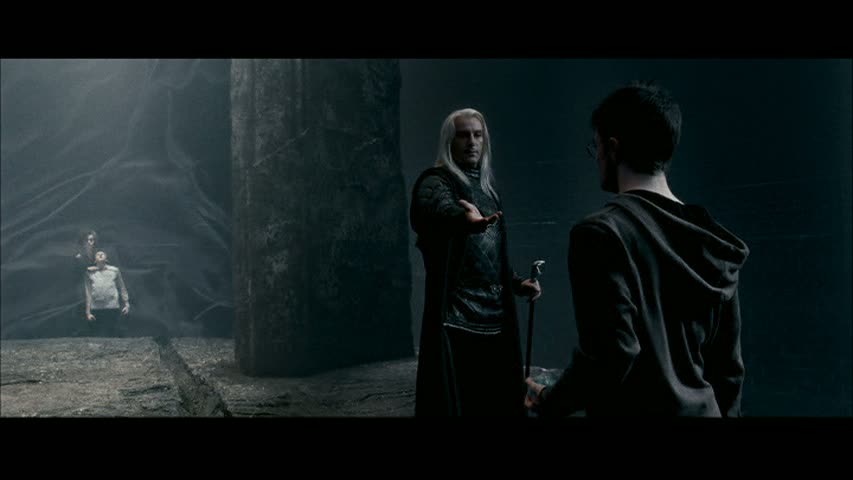
Is It Worth A Look: If you’re in for a penny, you’re for a pound at this point. But I’d go so far as to say that if you’re one of those people who’s been ducking in and out of the series, this is where I’d pick it up again. Not only is it, now, the exact midpoint of the franchise, but It’s a strong enough narrative on its own terms where I’d say only the events of Azkaban, and the graveyard scenes in Goblet are the only necessary bits of information. Shit gets very real from here on. If you’re not onboard from here, you’re never going to be.
Random Cinematic Anecdotes:
The film continues the trend of big-name fantasy directors being approached, and never taking the wheel. In this film’s case, Jean Pierre Jeunet was offered the chair, and declined, since he wasn’t a fan of how little control he’d have over the story. I wouldn’t trade Yates for the world, but hopefully now, you’re thinking of a batshit crazy Audrey Tautou as Bellatrix Lestrange and you’re as disappointed as I am.
Cinematc Soulmates: The rest of the Harry Potter series.

